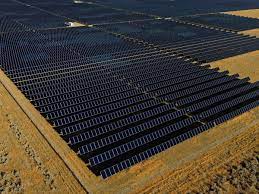News Based on facts, either observed and verified directly by the reporter, or reported and verified from knowledgeable sources.
Deficit fight risks clean energy jobs
 FILE - A solar farm sits in Mona, Utah, on Tuesday, Aug. 9, 2022. The U.S. Department of Agriculture announced a nearly $11 billion investment on Tuesday, May 16, 2023, to help bring affordable clean energy to rural communities throughout the country. (AP Photo/Rick Bowmer, File)
FILE - A solar farm sits in Mona, Utah, on Tuesday, Aug. 9, 2022. The U.S. Department of Agriculture announced a nearly $11 billion investment on Tuesday, May 16, 2023, to help bring affordable clean energy to rural communities throughout the country. (AP Photo/Rick Bowmer, File)
Indigenous clean energy job count: 37,987 and counting
It’s easy to dismiss the debate in Washington over the debt ceiling as irrelevant and crazy. Think about this: Democrats and Republicans are fighting over how to pay the bills for government programs that have already spent the money by promising to cut spending later. And, if you need more “what?” then subtract from those spending cuts the protected programs that cost the most, Defense, Social Security, Medicare and interest payments on the debt.
Yet the decisions made over the next few days will have huge implications for how the country navigates climate change – and what kinds of jobs that are created.
This is one of those debates that is multi-layered. On one level it’s about federal spending and about what’s important. But the costliest spending is off the table: Social Security, Medicare and tax cuts. Add to that interest on the debt because that cost is non-negotiable. So the fight centers on a tiny fraction of government, such as programs serving Indigenous people.
Under that layer there is a deeper policy debate about global warming. Republicans want to use this fight to unravel the clean energy initiatives of the Biden administration.
This is an important moment because it’s clean energy, not fossil fuels, that represents the growing economic boom.
A new report, The Clean Energy Boom in Communities of Color, puts numbers on the jobs front. “In the months since the landmark climate and clean energy investments became law, clean energy companies have announced or moved forward with 191 projects accounting for more than 140,000 new clean energy jobs for electricians, mechanics, construction workers, technicians, support staff, and many others. 129 of these projects are located in areas with sizeable communities of color, bringing more than 85,000 new jobs to communities of color across the United States,” the Climate Power report said. “As the largest U.S. investment in clean energy and climate in history, the Biden administration’s clean energy plan will continue to reshape and recharge our economy for many decades to come.”
The data from Climate Power shows that Indigenous communities are big winners in this transition with 48 new clean energy projects built with investments of more than $32.2 billion. The total clean energy job count: 37,987 and counting.
“States around the country have benefited from the provisions of the national clean energy plan,” Climate Power said. “Even climate deniers have touted the benefits of the law for their communities because they now understand that this clean energy plan means big investments and new jobs. Already, the new law has significantly benefited local economies and will provide family-sustaining wages in communities of color from coast to coast.”

One example of that is the Canoo Company’s EV battery module manufacturing facility based in Pryor, Oklahoma. The plant is being built on a 400-acre industrial plant and the company is partnering with the Cherokee Nation for job training. More than 2,000 will be hired when the plant is operational.
“We are accelerating our hiring plans in Pryor with the establishment of our EV Battery Module Manufacturing Facility,” said Tony Aquila, chairman and CEO at Canoo. “This is the first building block for Canoo’s production ramp strategy, with more news coming very soon.”
All told there are at least 48 projects in communities with sizable Native American populations, including some 25,000 jobs in Arizona, Nevada and Oklahoma.
This report does not include data from tribal enterprises that have started new ventures. The Inflation Reduction Act opens up a funding stream for tax credits and grants that can fund as much as 70 percent of the capital costs for a clean energy facility. The White House estimates that more than $32 billion is available “exclusively” for tribal nations.
Dividing lines
Republican members of Congress discount the green energy jobs being created, even in their own districts.
A report by the conservative Heritage Foundation said: “Environmental conservation and remedying toxic pollution are legitimate public concerns. However, federal programs for energy and the environment too often stray into subsidizing projects beloved by progressives that provide minimal real-world benefits.”
Heritage calls for “defunding the Left” because clean energy projects distort the market.
“The Department of Energy has spent decades attempting to steer the energy sector in a direction preferred by the Left through a combination of subsidization and regulation, favoring energy sources such as wind and solar over more practical and reliable ones such as nuclear and natural gas,” the report said. “This has led to vast market distortions without having a measurable effect on the climate-relevant emissions. Worse, many key components for batteries, wind turbines, and solar panels are made in China, which means U.S. taxpayers are subsidizing the highly polluting Chinese economy while impoverishing our own.”
Congress has to reach a consensus about two very policy directions. Indeed, no matter what happens on the debt resolution, it is a debate that will continue to surface on the farm bill, appropriations, and the next election.
One debate, for example, is about adding work requirements to existing programs such as the Supplemental Nutrition Assistance Program (food stamps). A million people a year receive food assistance under the program. “Speaker McCarthy’s bill would expand SNAP’s already harsh policy that takes food assistance away from many people aged 18 through 49 who don’t have children at home and can’t secure an exemption,” reports the Center for Budget and Policy Priorities.
Rep. Gwen Moore, D-Wisconsin, calls the GOP proposals a “MAGA bill” that doubles down on the Republican agenda. “When Republicans talk in scornful language about programs like SNAP, TANF, and Medicaid, they need to remember who actually benefits from these programs: the elderly, people with disabilities, struggling families, women providing unpaid care, and children,” she said. “The picture Republicans paint of a healthy, strong person who relies on these programs to bilk the system is so different from true lived experiences.”
The politics of the work requirement will be tricky – the White House is trying to find a compromise that can generate support from its most liberal members as well as a plan that Speaker McCarthy can sell to its right wing.
Over the weekend several senators called on President Biden to move on from this debate by unilateral action, citing the 14th amendment and it’s language that “The validity of the public debt of the United States, authorized by law, including debts incurred for payment of pensions and bounties for services in suppressing insurrection or rebellion, shall not be questioned.”
However President Biden, in an interview with MSNBC on Friday, was asked about the 14th Amendment proposal, saying, “I’ve not gotten there yet.” So the White House continues talking with House Republicans about a path forward.
House Minority Leader Hakeem Jeffries of New York reportedly told members of the House Democratic Steering and Policy Committee on Monday night that the Republican’s “work requirements are a nonstarter” in the debt limit discussions. And, last week members of the Freedom Caucus urged the speaker to stop negotiation with the White House and push the Senate to act on the House bill that lifts the debt ceiling along with massive budget cuts.
Both the Republicans and Democrats say polling supports their positions.
McCarthy cites an Axios-Ipsos survey that shows 63 percent of adults favor work requirements for SNAP and Medicaid.
And Democrats are pointing to a Navigator Research poll that shows that two-thirds of those surveyed want a debt ceiling increase because a default would be a worse outcome. Plus a majority continue to support the Inflation Reduction Act.
Who’s winning the policy debate? A new poll from The Associated Press-NORC Center for Public Affairs Research shows 27 percent say they approve of Biden and 26 percent say the same about congressional Democrats, while 22 percent approve of congressional Republicans. Close to half disapprove of each.
That same poll shows about 6 in 10 say they want any increase in the debt limit to be coupled with agreed-upon terms for reducing the federal budget deficit.
A divided country. On Friday Republicans walked out of a negotiation with the White House. And yet the deadline for consensus is coming fast. The Treasury estimates the “X” date, or the moment when the United States runs short of money, as June 1. The Congressional Budget Office estimates that $25 billion will need to go out the door that day to pay Social Security, active-duty members of the military, civil service and military retirees, and veterans. Many of the bonds – the interest payments for money borrowed by the Treasury – also come due on the first. (Although most bonds are in 6-month cycles and the due date will be July 1.)
A new round of talks between the White House and Speaker McCarthy is scheduled for Monday.
